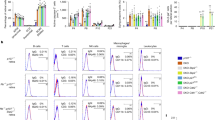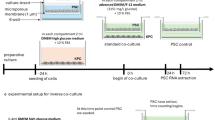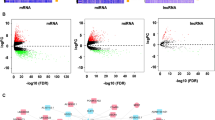Abstract
Cyclin-dependent kinase inhibitors (CDKI) are negative regulators of cell cycle progression by binding the cyclin-CDK complex and inhibiting the CDK activity. Genetic alteration in the CDKI genes has been implicated for carcinogenesis. To test the genetic alteration in the p27 and p57 genes, KIP family CDKI genes, 30 gastric tumor-normal pairs and 8 gastric cancer cell lines were analyzed for mutations by polymerase chain reaction-single strand conformational polymorphism (PCR-SSCP). No mutation was detected in these genes although length polymorphisms in the proline-alanine repeat of the p57 gene were detected. When the p27 and p57 mRNAs were analyzed in gastric cancer cell lines by RT-PCR, the p27 mRNA was expressed considerably high in tumor cells but expression of the p57 mRNA was much low in gastric cancer cell lines compared to that of normal cells. The result suggests that inactivation of gene expression rather than mutations in the p57 gene accounts possibly for the involvement of this gene in tumorigenesis of gastric cancer. However, expression of the p27 gene seems to be essential for cell survival.
Similar content being viewed by others
Article PDF
Author information
Authors and Affiliations
Rights and permissions
This is an Open Access article distributed under the terms of the Creative Commons Attribution Non-Commercial License (http://creativecommons.org/licenses/by-nc/3.0/) which permits unrestricted non-commercial use, distribution, and reproduction in any medium, provided the original work is properly cited.
About this article
Cite this article
Shin, JY., Kim, HS., Lee, KS. et al. Mutation and expression of the p27KIP1 and p57KIP2 genes in human gastric cancer. Exp Mol Med 32, 79–83 (2000). https://doi.org/10.1038/emm.2000.14
Published:
Issue date:
DOI: https://doi.org/10.1038/emm.2000.14
Keywords
This article is cited by
-
Expressions and the clinical significances of p53, p57(Kip2) and CD68 in esophageal squamous cell carcinoma
The Chinese-German Journal of Clinical Oncology (2013)
-
Gene expression in response to ionizing radiation and family history of gastric cancer
Familial Cancer (2011)
-
The Cdk inhibitor p57Kip2 controls LIM-kinase 1 activity and regulates actin cytoskeleton dynamics
Oncogene (2009)
-
The cell cycle inhibitor p57Kip2 promotes cell death via the mitochondrial apoptotic pathway
Cell Death & Differentiation (2007)
-
Methylation of p16INK4A and p57KIP2 are involved in the development and progression of gastric MALT lymphomas
Modern Pathology (2006)



